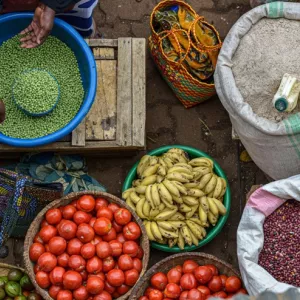CGIAR Highlights Key Role of Research Collaboration at 6th AU-EU Ministerial Conference
Rome, Italy, 27 June 2025 – Our current agri-food systems are responsible for up to 37% of greenhouse gas emissions, threaten 86% of species currently at risk of extinction, drive 80% of deforestation, account for 70% of global freshwater use while letting 1/3 of our food goes to waste. The 6th African Union (AU) – European Union (EU) Agriculture Ministerial

CGIAR Highlights Key Role of Research Collaboration at 6th AU-EU Ministerial Conference
Rome, Italy, 27 June 2025 – Our current agri-food systems are responsible for up to 37% of greenhouse gas emissions, threaten 86% of species currently at risk of extinction, drive 80% of deforestation, account for 70% of global freshwater use while letting 1/3 of our food goes to waste. The 6th African Union (AU) – European Union (EU) Agriculture Ministerial Conference gathered AU and EU Ministers of Agriculture in Rome, Italy, together with representatives of other international organizations to discuss key aspect on strengthening the collaboration and addressing current challenges facing both Continents’ agri-food systems.
CGIAR took part in this high-level conference, reaffirming its vital role in advancing research and innovation to boost agricultural development across Africa. Representing CGIAR Executive Managing Director Dr Ismahane Elouafi, Dr. Baboucarr Manneh, Director General of Africa Rice Center (AfricaRice), delivered a compelling keynote address during the session on research, innovation, and technology. His remarks highlighted the importance of international collaboration, addressed key challenges, and explored emerging opportunities to enhance the impact of agricultural research and innovation systems on the continent. CGIAR’s cutting-edge research on global climate and biodiversity challenges to transform agri-food systems sustainably and equitably is a critical contribution in achieving the European Union and Africa Union sustainable objectives. The international partnership groundwork includes strategic pillars: i) Scaling of innovations; ii) Strengthening R&I infrastructure; iii) Science diplomacy and global convening; iv) Capacity sharing. By fostering mutual trust and co-creation, AU-EU cooperation can drive resilient agri-food systems, nurture public-private partnerships, and unlock innovation-driven growth to boost productivity, nutrition, and rural livelihoods.

“With the right partnerships and engagements, challenges such as unequal partnerships, policy misalignment and resource gaps can be overcome for the efficient delivery of research and innovations in Africa”, explained Dr. Baboucarr Manneh DG of AfricaRice. With a global network of 15 Research Centers—including Africa-based leaders like AfricaRice, IITA, ILRI, and CIFOR-ICRAF—CGIAR brings over 50 years of proven expertise in agricultural innovation and development. Backed by strong partnerships with regional and global institutions, including International Financial Institutions, CGIAR has a long-standing track record of co-developing cutting-edge agricultural technologies and impactful policy solutions. Working closely with national and regional stakeholders, CGIAR continues to drive sustainable transformation across food systems in Africa and beyond.
The impact of CGIAR technologies and innovations on food and nutrition security in the Global South is both profound and measurable. Nearly half of the world’s wheat cultivation area uses CGIAR-developed varieties, while improved rice varieties from CGIAR Centers like AfricaRice, Alliance Bioversity & CIAT, and IRRI have generated economic benefits nearing $11 billion USD. In addition, nutrient-rich, biofortified crops—such as orange-flesh sweet potatoes, quality protein maize, and high-zinc rice—have reached over 50 million people, improving diets and health outcomes. The widespread adoption of these innovations has contributed to a one-third reduction in infant mortality and opened new job opportunities for youth and women, underscoring CGIAR’s pivotal role in building resilient, nutrition-sensitive food systems across the developing world. In addition, CGIAR new 2025 – 2030 Research and Innovation Strategy is designed to be more responsive, more inclusive, and more aligned with regional strategies, such the Comprehensive Africa Agriculture Development Programme (CAADP).

